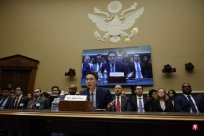Kashikari, president of the Federal Reserve Banking Banking Bank of Minnes, believes that it is predicted that how the bank pressure will affect the decisions of the next interest rate meeting, which is too early;He said that the turbulence of the banking industry has led to the decline in bank loans, which may help reduce inflation, and the number of interest rate hikes will be reduced.
(Washington Composite Electric) officials from the Federal Reserve said that the recent banking turbulence has increased the risk of economic recession in the United States, but it is too early to judge economic and monetary policy.
When NEEL Kashkari, president of the Federal Reserve Banking Bank of the Federal Reserve Bank, was interviewed by the United States Colombian Broadcasting Corporation (CBS) program on Sunday (March 26), asked whether the banking industry turmoil would lead to the United StatesFalling into a recession, he replied: "This is undoubtedly closer to us."
Kashkali said: "What we don't know is how much credit will cause the pressure of these banks. Will this slow down? We are paying close attention."
Kashkali can participate in monetary policy voting this year.He believes that it is predicted that how the bank's pressure will affect the decision -making of the next interest rate meeting is too early; but he pointed out that "the current bank industry turmoil leads to a bank loan fall, which may help reduce inflation.The number of times will be reduced. "
The Federal Public Marketing Committee responsible for the formulation of US monetary policy will be concluded from May 2nd to 3rd.At the last policy meeting that ended on March 22, the Federal Reserve raised the benchmark interest rate by 25 basis points, showing that although the second largest bank closure incident in the United States had occurred in the United States, the economic uncertainty was improved.Give up to suppress inflation.After that round of interest rate hikes, the benchmark interest rate reached 4.75%to 5%.
After the Silicon Valley Bank and the Mark Bank of Silicon Valley closed down, and the difficulty of Credit Swiss was acquired by the Swiss bank, the impact of governments around the world on this series of events remained highly vigilant.
Kashkali said that although the US banking system is stable and banks have strong capital and a lot of liquidity, it takes time to completely solve the current problem."Sometimes, the system needs longer to discharge all the pressure. The positive signs are that the outflow of deposit seems to have slowed down, and the confidence in small banks and regional banks has restored."
Since the United States has entered the interest rate hike period, many financial institutions holding US Treasury bonds are faced with book floating losses, which is one of the reasons for the failure of Silicon Valley banks.
Kashkali said that other banks also highly exposed in the field of US Treasury and commercial real estate, which may bring problems.He also said that the capital market has been closed in the past two weeks. If this situation continues, the economy may suffer more pain.
At the same time, the European Central Bank believes that the recent bank industry turmoil may lead to slower economic growth and the decline in inflation.
Economists have predicted that the United States has declined this year and continues to face high inflation next year
The Vice President of the European Central Bank Dukinson told the Irish Business Post: "Our impression is that the credit standards of the euro zone will be further tightened. Perhaps this will lead to slower economic growth and inflation."
On the other hand, a half -year survey launched by the National Commercial Economy Association (NABE) found that most economists predict that the United States may fall into recession this year and continue to face high inflation in 2024.
More than two -thirds of the respondents believe that the inflation rate at the end of this year will remain above 4%.However, only 5%of interviewees believe that the United States is currently in a decline, "far lower than" 19%of the last survey.
Economist's confidence in the Fed's "soft landing" has also increased slightly, from 27%in August last year to 30%.



